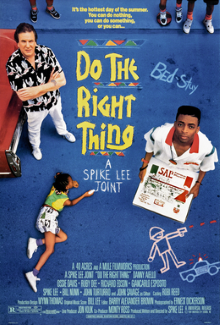
I added this to my list when BlacKkKlansman put Spike Lee back into the spotlight and many people pointed to this as the director’s best work. I found the newer film to be enjoyable but not all that great. This one however is fantastic and, no doubt as the director intended, is an amazing piece for sparking conversations about as everyone debates who in the film, if anyone, actually did the right thing and what the director really intended to convey.
One hot Saturday in Brooklyn, Mookie leaves the apartment he lives in with his sister to go to work at the local pizzeria. The place is run by Sal and his two sons Pino and Vito. Pino is unapologetically racist against blacks while Vito is on friendly terms with Mookie. As we watch Mookie walk around delivering pizzas, we also get a good look at the varied people who are part of the community including the Korean owners of a sundry shop and Latinos. Then Mookie’s friend Buggin’ Out comes into the pizzeria to complain about the lack of any black people on the Wall of Fame and is thrown out. He then goes around trying to get people to boycott the business but is ridiculed. Only Radio Raheem supports him, a big guy who goes around with a boombox loudly blaring out music by Public Enemy and who was ordered by Sal to turn off the music earlier.
There’s very little plot in this one and it feels almost like a documentary as the camera roams across the locals who are out in the streets due to the heat. The children play freely in the streets and someone turns on the water in a fire hydrant to let everyone cool off. A local drunk who calls himself the Mayor wanders up and down the street and is mostly respected by other people except an old woman called Mother Sister who watches over the whole neighborhood from her building. Smiley, a white mentally disabled man with a stutter tries to sell photographs of Martin Luther King, Jr. and Malcolm X. Their opinions, prejudices and attitudes to life are all in evidence as we follow the various conversations. There’s even commentary provided by the deejay of the local radio station, played by Samuel Jackson, and a Greek chorus in the form of three middle-aged black guys who just sit around bullshitting each other.
Of course it all ends in a sudden, shocking explosion of violence that prompts the audience to question who is right and who is wrong. It’s easy to see that this film is so well-liked and holds such enduring value because the director seems fair-minded and resists clearly marking out characters as good or bad. Spike Lee himself plays Mookie here, which leaves me shocked at how he was able to make a film of such sophistication at such a young age, but he doesn’t shy away from exposing Mookie’s many flaws. He doesn’t take his job very seriously, taking his time to go about his duties and appears to be an irresponsible father. The black community as a whole aren’t exactly portrayed as saints here either. The Mayor may be well meaning and affable but he’s still a drunk. Radio Raheem uses his physical size to intimidate people and parades around with his boombox as an overt challenge. In the finale, even the seemingly gentle Mother Sister gets caught up by rage and the heat of the moment.
While it may be tempting to interpret this as being a ‘both sides’ kind of deal in which all parties have their bad sides, judging from Spike Lee’s character and history plus the historical background and context of the film, I don’t believe this to be the case. Instead he’s saying so what if Mookie isn’t a perfect worker, he still deserves being treated with respect as a person. So what if Radio Raheem is a bit of a jerk, that doesn’t excuse what the police did. Even it deliberately shows that even if Sal has run a well-liked business in the neighborhood for 25 years and is on good terms with the local residents, he still reverts to using the word ‘nigger’ when angry. It’s a much bolder, more combative stance than I think most commentators realize, which makes it stand out from works that are limply neutral in the interests of trying to seem fair. In the end, the one constant of this film is that it demands respect on behalf of black people.
Personally I think that while black people have every right to be angry as they are here, there should still be some consideration for how useful or practical it would be to keep holding onto that rage and freely giving expression to it. Debating that is far outside the scope of this post however and I don’t really know enough about black issues in the US to comment much. I do know that Do the Right Thing is an incredibly powerful and yet subtly sophisticated expression of that anger and could not have been possible without a deep understanding of the community of the very specific neighborhood. Watching all that artistry is an incredible rush and that’s why this is such a great film.